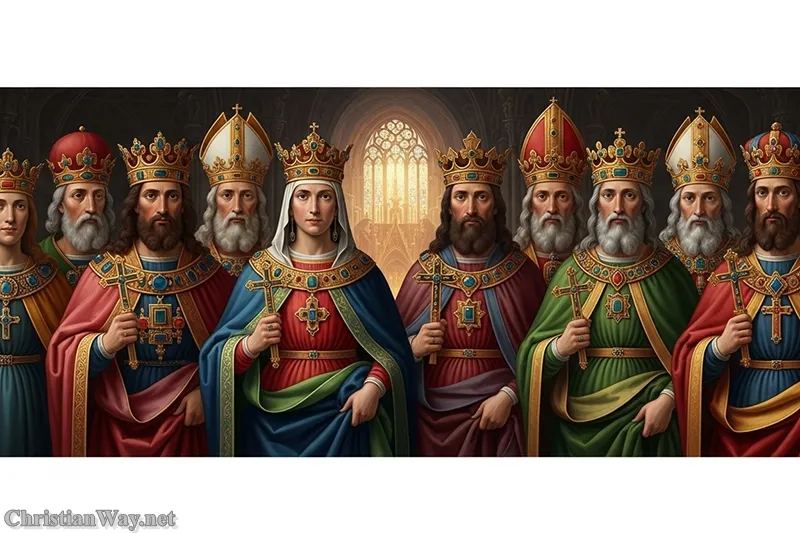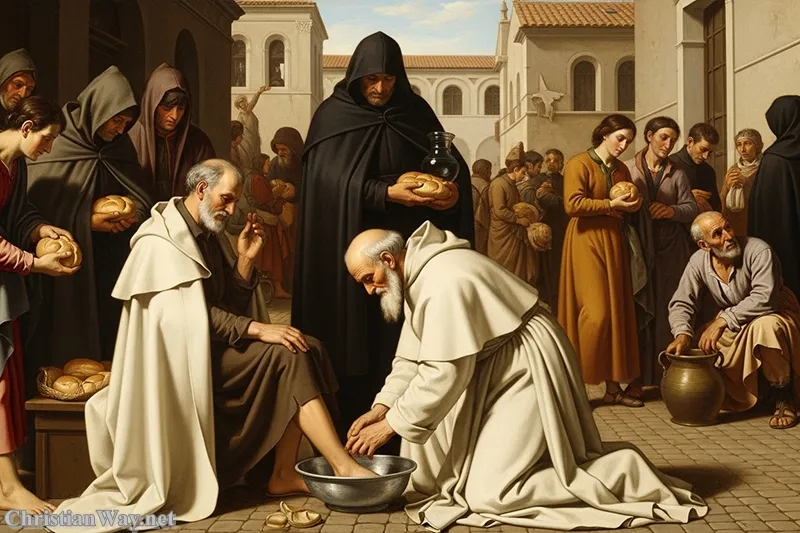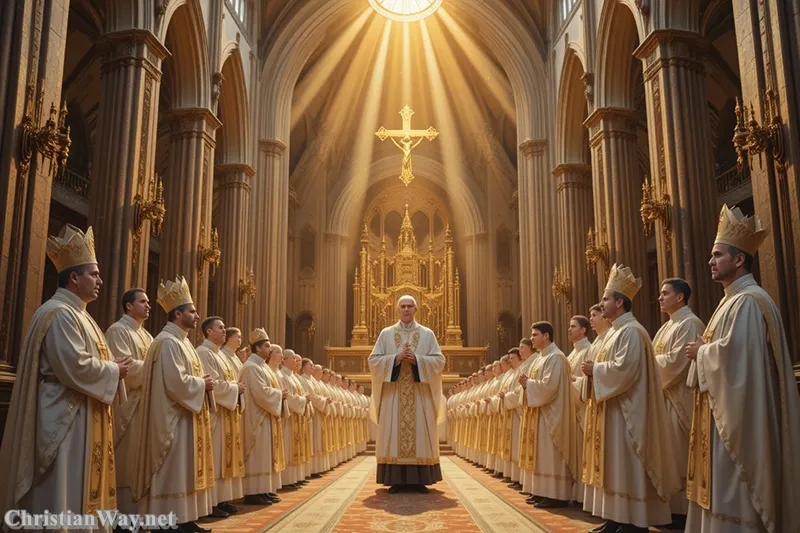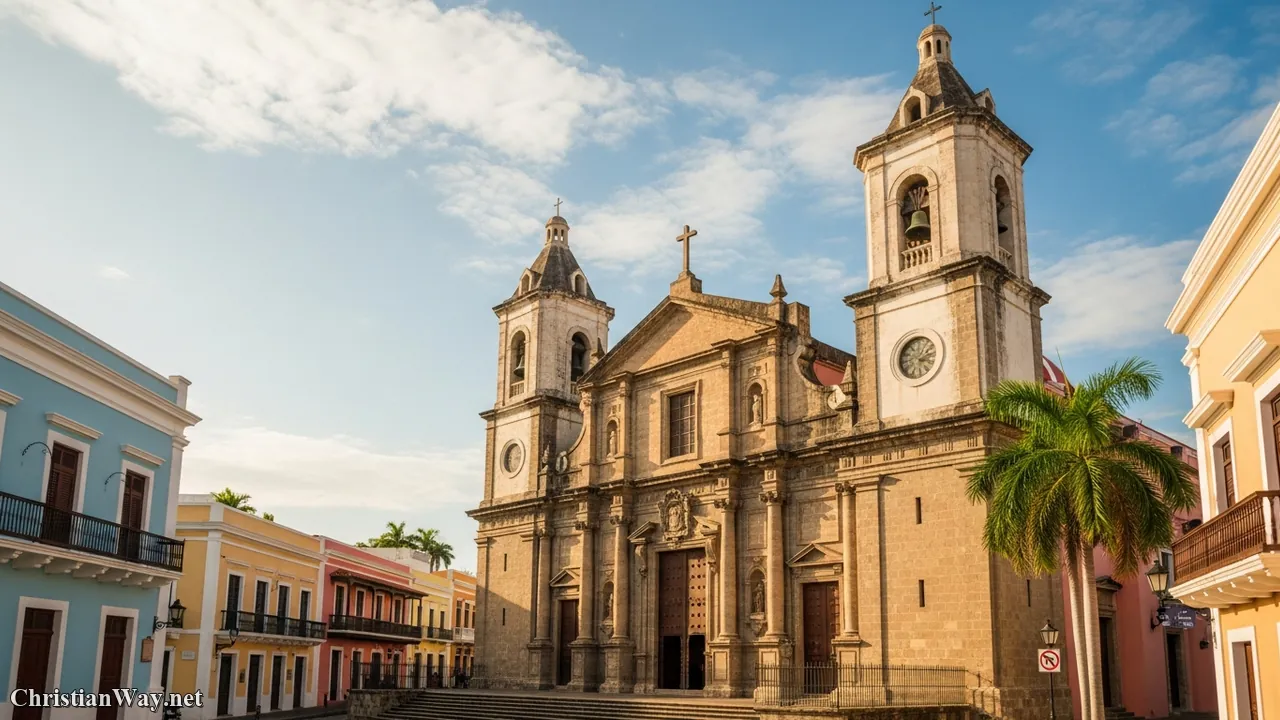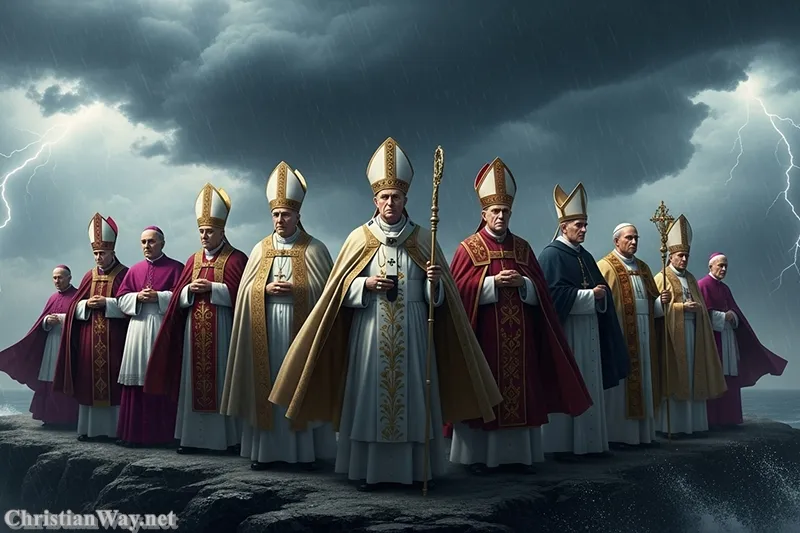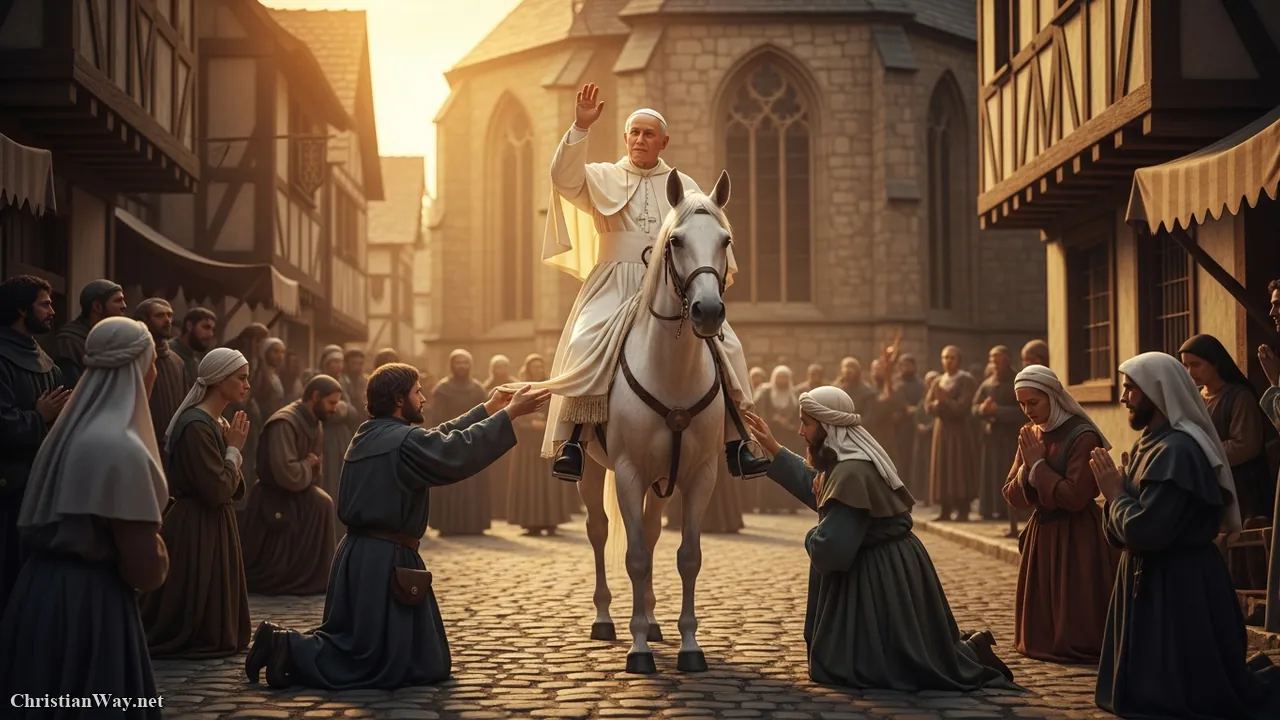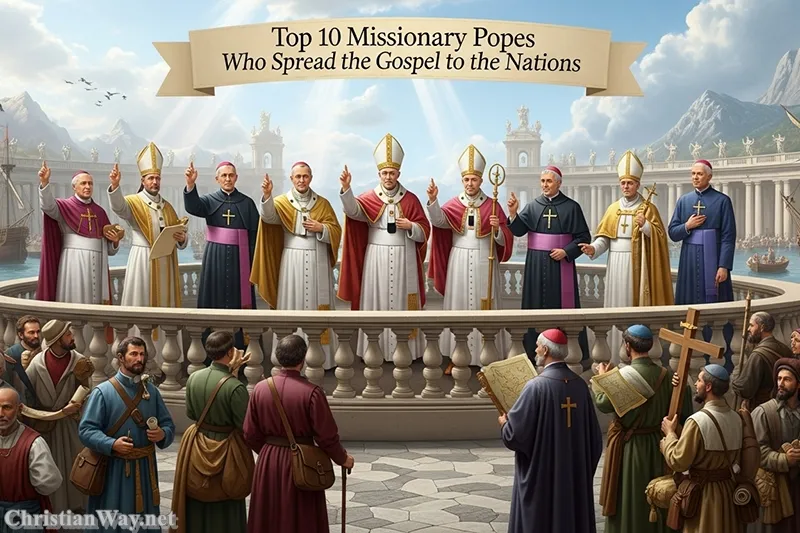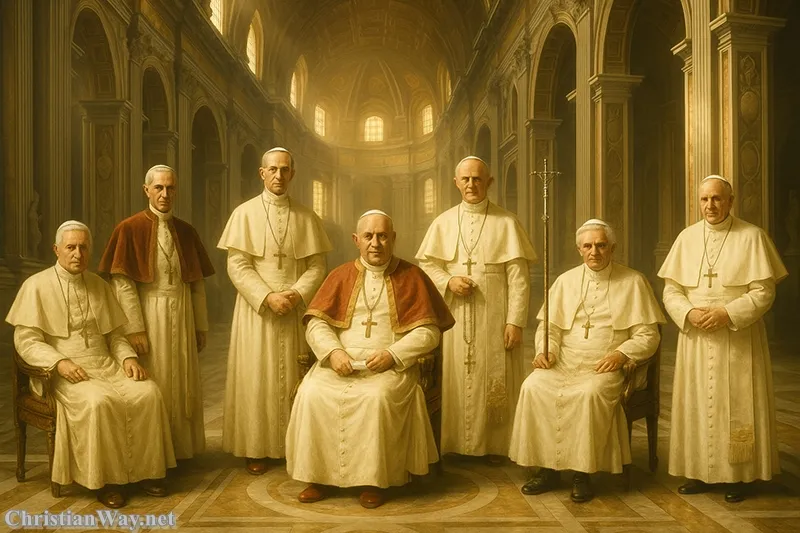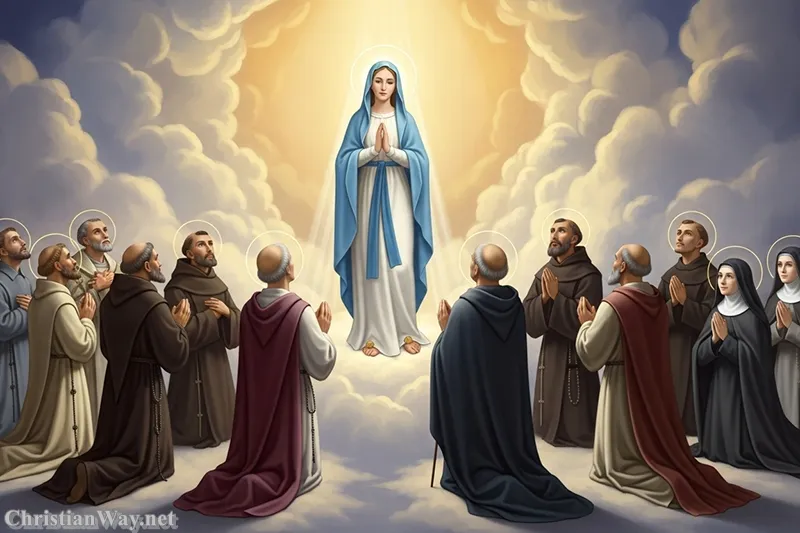Dear friends, as we reflect on the long, unbroken line of succession that stems from the Apostle Peter, it is natural to be drawn not just to the power or politics of the papacy, but to its true and eternal core: holiness. The Chair of Peter is fundamentally a pulpit of service, a burden of spiritual fatherhood, and a witness to Christ’s light in a world that often prefers the shadows. To be a Pope is to be the Servant of the Servants of God, and to be a saintly Pope is to have fulfilled that charge heroically.
The earliest Bishops of Rome were often martyrs, simple shepherds who laid down their lives for the flock, knowing Christ’s promise: “If they persecuted me, they will persecute you also” (John 15:20). As the Church moved beyond persecution into the complexities of the world, the challenges to holiness shifted from the executioner’s sword to the subtle temptations of power and administration. Yet, in every age, the Holy Spirit has raised up men in the highest office who, through profound humility, theological clarity, and radical charity, proved that the keys of the Kingdom belong to the pure in heart.
This list is not a ranking of political influence, but a meditation on spiritual greatness. As we journey through the lives of these ten Holiest Popes Recognized as Saints, we seek not to glorify the office, but to glorify the God who worked mightily through these men. Their sanctity is a constant source of encouragement for all of us here at Christian Way, reminding us that no vocation—no matter how high or humble—is exempt from the universal call to holiness given by Christ Himself. Let us open our hearts to their stories and allow their virtues to inspire our own daily walk of faith.
Table of The Top 10 Holiest Popes Recognized as Saints
| Rank | Saintly Pope (Reign) | Primary Contribution to Sanctity | Canonized By |
|---|---|---|---|
| 10 | St. Leo IX (1049–1054) | Combated abuses like simony, initiated the Gregorian reforms, and traveled extensively to defend Church liberty. | Cultus confirmed by Pope Gregory VII |
| 9 | St. Pius V (1566–1572) | Enforced the decrees of the Council of Trent, standardized the Roman Missal, and reformed clergy discipline. | Pope Clement XI (1712) |
| 8 | St. Pius X (1903–1914) | Encouraged frequent Holy Communion, lowered the age for First Communion, and vigorously opposed Modernism. | Pope Pius XII (1954) |
| 7 | St. Paul VI (1963–1978) | Completed and implemented the Second Vatican Council, tirelessly promoted peace, and authored Humanae Vitae. | Pope Francis (2018) |
| 6 | St. John XXIII (1958–1963) | Called the Second Vatican Council; known as “Good Pope John” for his immense pastoral warmth and focus on unity. | Pope Francis (2014) |
| 5 | St. Leo the Great (440–461) | Doctor of the Church; defended the orthodox Christological doctrine at the Council of Chalcedon. | Pre-Congregation (Acclamation) |
| 4 | St. John Paul II (1978–2005) | Apostle of the modern world; role in the fall of Communism, World Youth Days, and the proclamation of the Gospel of Life. | Pope Francis (2014) |
| 3 | St. Celestine I (422–432) | Defended the title of Theotokos (Mother of God) against Nestorius, ensuring the orthodox understanding of Christ. | Pre-Congregation (Acclamation) |
| 2 | St. Gregory the Great (590–604) | Doctor of the Church; formalized Gregorian Chant, championed missions (especially to England), and signed letters as “Servant of the Servants of God.” | Pre-Congregation (Acclamation) |
| 1 | St. Peter (c. 30–67) | The Rock (Cephas); the first Bishop of Rome, Apostle, and ultimate martyr for Christ. | Apostolic Recognition |
Top 10. St. Leo IX (Bruno of Egisheim-Dagsburg), Pope from 1049–1054
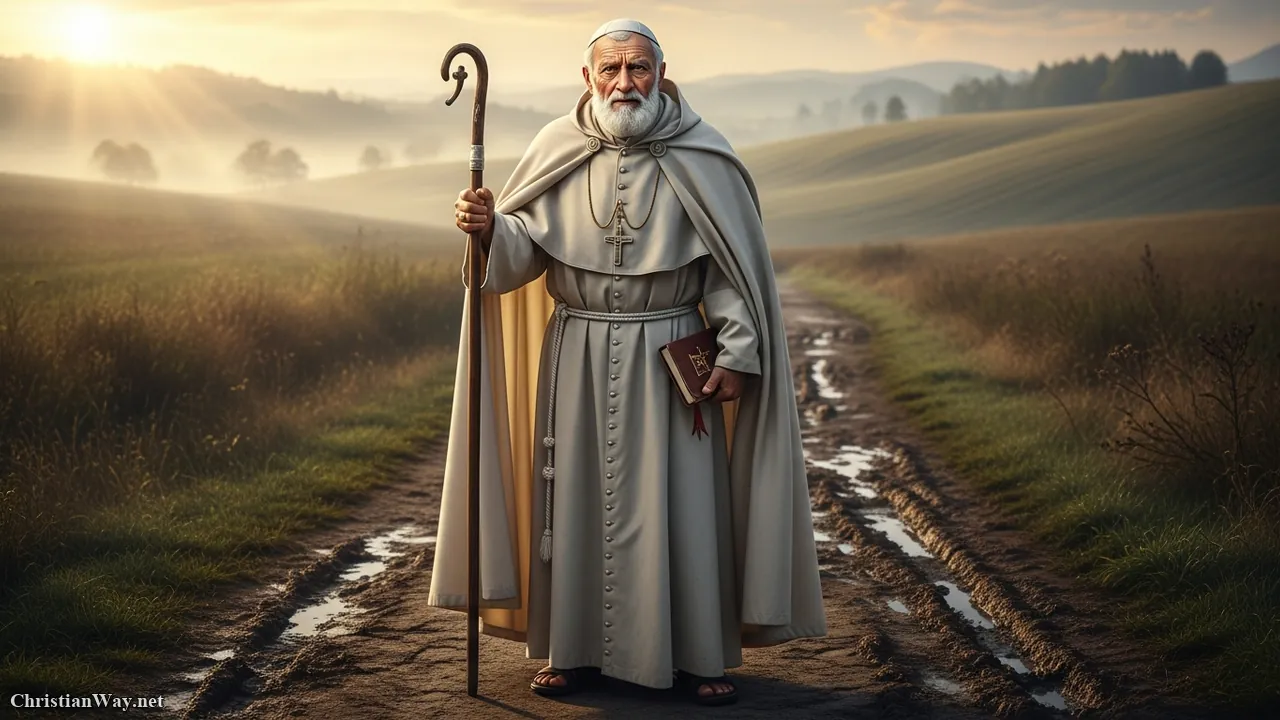
1. The Scene (Context): Before his election, Bruno of Egisheim-Dagsburg was a well-respected bishop with a reputation for both piety and administrative energy. Upon his reluctant ascension to the Chair of Peter, he immediately set a tone of moral reform. He did not settle into the Roman palace as previous Popes had done; instead, he spent nearly all of his five-year pontificate traveling across Europe, presiding over synods in Germany, France, and Italy. One can picture him—a man of noble birth but humble disposition—crossing the rugged roads, preaching to the local people, and holding powerful bishops and secular rulers accountable to the Gospel. He literally took the Petrine ministry out of the palace and into the streets.
2. The Theology (Meaning): St. Leo IX saw the diseases of simony (the buying and selling of Church offices) and clerical marriage as cancers eating away at the spiritual authority of the Church. His constant activity and personal witness were a living commentary on Christ’s command to “cleanse the temple” (Matthew 21:12-13). He understood that the Church’s mission required moral and spiritual integrity, and his courage in confronting powerful abusers was a testament to the fact that divine law—the integrity of the priesthood—must supersede earthly ambition.
3. The Application (Pastoral Care): For the modern believer, St. Leo IX is a challenge against spiritual complacency. His life shows that reform must begin at the top, but it is accomplished through personal sacrifice and diligence. When we see corruption or inertia in our own spiritual lives or communities, his example bids us to not just complain, but to actively move, travel, and work tirelessly for the truth, trusting that God will uphold the purity of His Church through the faithfulness of its members.
Spiritual Highlights
- Traveled more than any other Pope until the 20th century, personally presiding over critical reform councils.
- Fought relentlessly against simony and other moral corruption of the clergy.
- Scriptural Anchor: “The Son of Man did not come to be served, but to serve, and to give his life as a ransom for many.” (Mark 10:45)
Top 9. St. Pius V (Antonio Ghislieri), Pope from 1566–1572
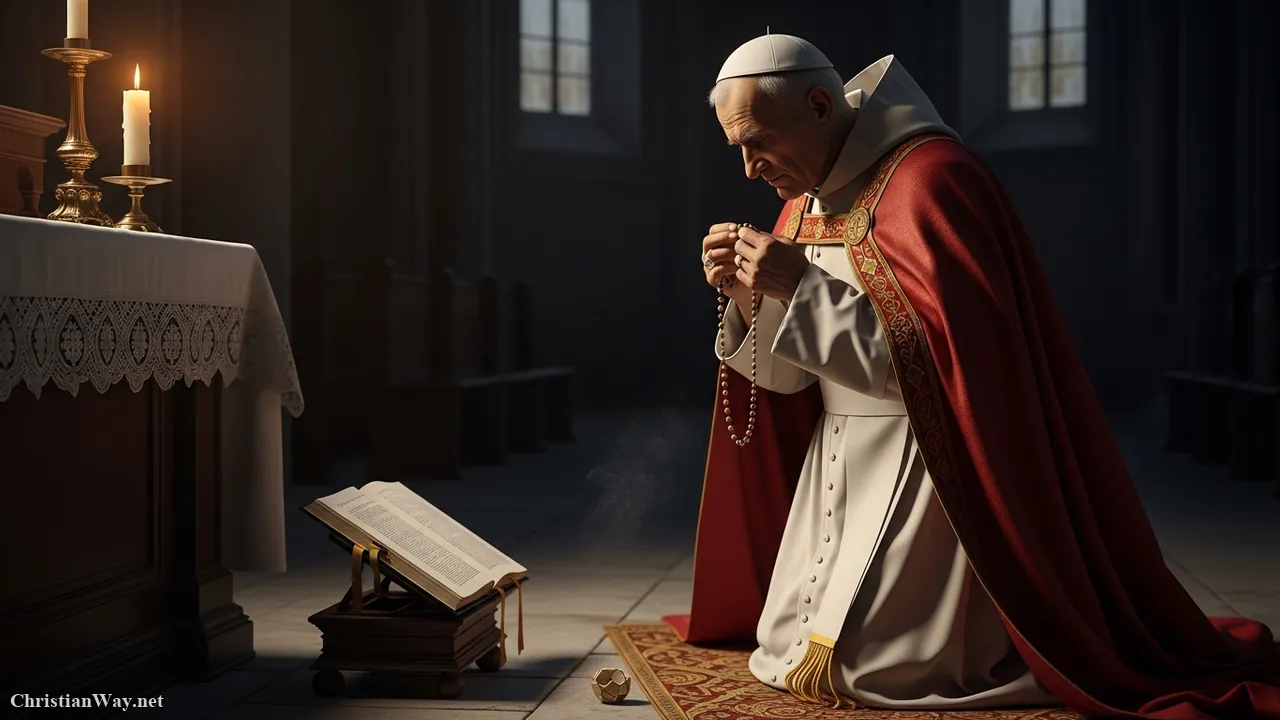
1. The Scene (Context): St. Pius V arrived in Rome as the reforming energy of the Council of Trent was at a critical juncture. A Dominican friar known for his extreme personal austerity—he continued to wear his simple wool habit under the papal vestments—his life was a rebuke to the lavishness that had plagued the Renaissance papacy. His pontificate was marked by decisive action: he drove corruption from the Vatican, standardized the liturgy (publishing the Roman Missal of 1570, which cemented the Tridentine Mass), and was personally a man of deep, mystical prayer, frequently found in adoration.
2. The Theology (Meaning): His most profound theological contribution was the practical implementation of the Council of Trent, which gave the Church a clear structure and spiritual backbone in the face of the Reformation. By standardizing the Mass and publishing the Catechism, he ensured that the faithful had access to the authentic springs of the Catholic Faith. His faith was also military—he is credited with organizing the Holy League that achieved victory against the Ottoman fleet at the Battle of Lepanto, famously attributing the victory to the intercession of the Blessed Virgin Mary through the praying of the Rosary, which became known as Our Lady of Victory.
3. The Application (Pastoral Care): St. Pius V reminds us that genuine holiness is inseparable from devotion to truth and order. His focus on the Mass and the Catechism shows us that our spiritual strength comes from the well-ordered life of prayer and clear teaching. When the world feels chaotic or threatening, we are called, like the faithful of his time, to take refuge in the Sacraments, the doctrines of the Church, and the powerful, intercessory prayer of the Rosary, putting our trust not in human armies, but in the power of God.
Spiritual Highlights
- Standardized the Roman liturgy (Tridentine Mass), ensuring uniformity and clarity in worship.
- Lived a life of extreme personal penance and simplicity, even as Pope.
- Scriptural Anchor: “Therefore, put on the full armor of God, so that when the day of evil comes, you may be able to stand your ground…” (Ephesians 6:13)
Top 8. St. Pius X (Giuseppe Sarto), Pope from 1903–1914
1. The Scene (Context): The 20th century began with a Pope of such gentle piety that his motto was simply, Instaurare Omnia in Christo (“To Restore All Things in Christ”). St. Pius X was a man of humble, peasant origins who rose through the ranks solely on the basis of his pastoral devotion. He is perhaps best remembered for his revolution of spiritual practice: he lowered the age for First Communion, declaring that children should receive the Eucharist as soon as they reach the age of reason, and fervently promoted frequent, even daily, Holy Communion for all the faithful, combating the Jansenistic tendency to hold the Eucharist at a distance due to fear.
2. The Theology (Meaning): The theology behind his actions was a profound understanding of the Eucharist as “the shortest and safest way to Heaven.” He insisted that the Mass was not merely a ceremony for the priests, but the very source and summit of Christian life, which must be accessible to the people. Furthermore, he took a firm stand against the subtle theological errors of Modernism, which sought to undermine the foundational truths of faith and Scripture, seeing these errors as a direct threat to the salvation of souls.
3. The Application (Pastoral Care): For us today, St. Pius X is the Pope of the Altar. His life teaches that our primary spiritual resource is the Real Presence of Jesus Christ in the Holy Eucharist. He encourages us to cultivate a childlike longing for Communion—a simplicity and purity of heart that sees the greatness of God in the humble host. His courage in facing intellectual threats reminds us to anchor our faith not in the passing philosophies of the day, but in the unchangeable Word of God.
Spiritual Highlights
- The “Pope of the Eucharist,” who encouraged daily communion and lowered the age for First Communion.
- Fought the philosophical and theological errors of Modernism with firmness and clarity.
- Scriptural Anchor: “Whoever eats my flesh and drinks my blood has eternal life, and I will raise them up at the last day.” (John 6:54)
Top 7. St. Paul VI (Giovanni Montini), Pope from 1963–1978
1. The Scene (Context): Inheriting the papacy after the death of St. John XXIII, St. Paul VI was tasked with the immense and often painful duty of completing and implementing the reforms of the Second Vatican Council. His was a pontificate of paradox: he was a pilgrim Pope, the first to visit all five continents, an embrace of the global Church; yet, he was also a man deeply marked by a sense of tragedy, navigating the post-conciliar upheaval and the cultural revolutions of the 1960s and 70s. We see in him a true man of sorrow, striving to hold the Church together through love and truth.
2. The Theology (Meaning): His landmark encyclical, Humanae Vitae (On Human Life), stands as his clearest witness to heroic virtue. In the face of near-universal pressure from both within and outside the Church to change the Church’s ancient teaching on life and love, he stood firm, restating the beautiful truth of married love as permanently open to the gift of children. His canonization affirms that a Pope’s holiness can be revealed in the courage to speak the prophetic word of Christ, even when it is unpopular, trusting that God’s truth, not human approval, is the measure of fidelity.
3. The Application (Pastoral Care): St. Paul VI’s spiritual legacy is one of courage in consistency. For every soul struggling with the confusion of the modern age, his example offers comfort: true love requires sacrifice, and true fidelity demands that we hold to the revealed truths of God, even in isolation. He asks us to embrace the missionary mandate to share the Gospel not by changing its message, but by living it out with integrity and boundless love.
Spiritual Highlights
- Completed the Second Vatican Council and inaugurated the Post-Conciliar reforms.
- Authored the prophetic encyclical Humanae Vitae, on the sanctity of life and the nature of married love.
- Scriptural Anchor: “For God did not give us a spirit of timidity, but a spirit of power, of love and of self-control.” (2 Timothy 1:7)
Top 6. St. John XXIII (Angelo Roncalli), Pope from 1958–1963
1. The Scene (Context): When Angelo Roncalli was elected, he was widely regarded as a transitional, elderly figure. Yet, this “Good Pope John” utterly confounded expectations. He immediately charmed the world with his immense, radiant kindness, his disarming humility, and his profound pastoral heart. He broke protocol to visit children’s hospitals and prisons in Rome, bringing the warmth of the Gospel to the forgotten. His great act, however, was in the quiet conviction that led him to call the Second Vatican Council, a move that stunned the world and changed the course of the Church.
2. The Theology (Meaning): The spiritual depth of his call for the Council lay in the concept of aggiornamento—”bringing up to date.” He did not seek to change doctrine, but to revitalize the Church’s manner of presenting the timeless Gospel to the modern world, looking to the future with hope rather than fear. His final great encyclical, Pacem in Terris (Peace on Earth), was a beacon of Catholic Social Teaching addressed not just to Catholics, but to “all men of good will,” recognizing the shared dignity of every person and the universal desire for peace and justice.
3. The Application (Pastoral Care): St. John XXIII’s life is a sermon on the power of humble love and trust. He shows us that the greatest changes are often initiated by the simplest hearts, men and women who see the world not with the cynicism of the powerful, but with the hope of a spiritual father. He encourages us to seek unity where there is division, to look for the good in others, and to approach the world with a gentle, evangelical optimism, believing that the Holy Spirit is always working toward renewal.
Spiritual Highlights
- Universally beloved as “Good Pope John” for his warmth and simplicity.
- Called the world-changing Second Vatican Council for the renewal of the Church.
- Scriptural Anchor: “Blessed are the peacemakers, for they shall be called children of God.” (Matthew 5:9)
Top 5. St. Leo the Great, Pope from 440–461
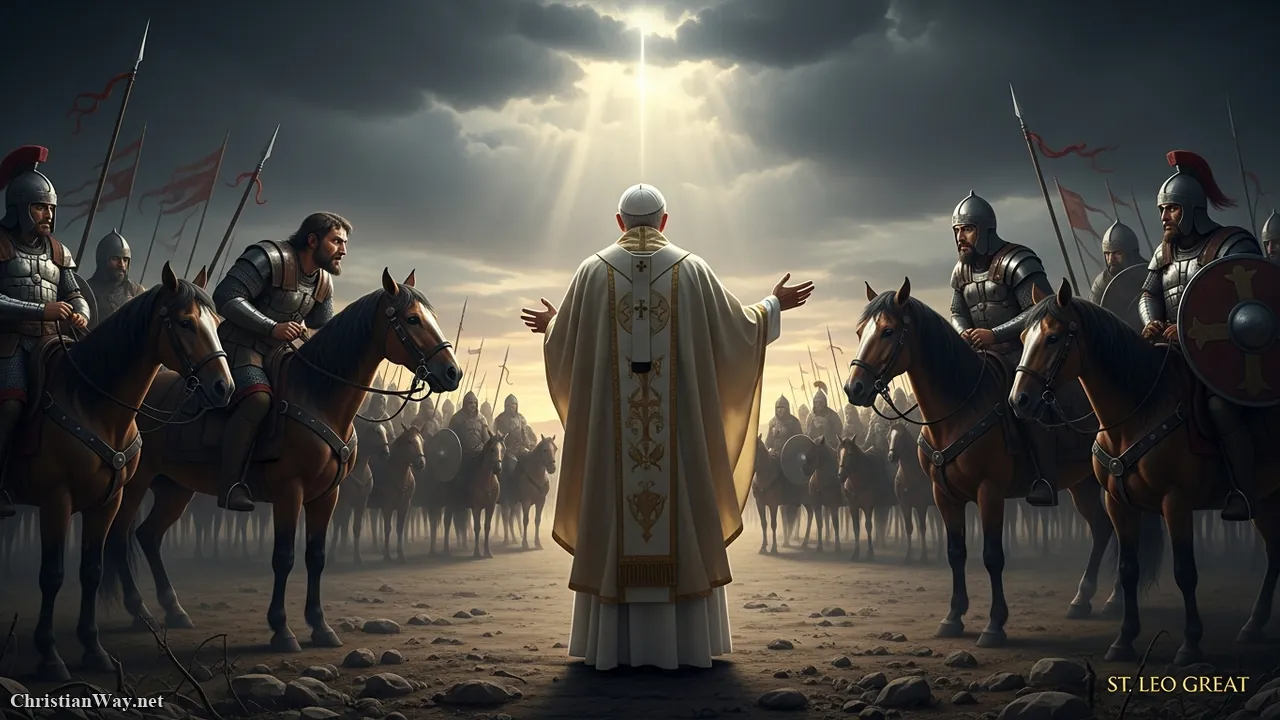
1. The Scene (Context): St. Leo I, deservedly given the title “The Great,” was a towering figure during the fall of the Roman Empire and a time of intense theological dispute. His most famous historical act was his single-handed diplomacy in 452, when he met the fearsome Attila the Hun outside the city of Rome and, through a combination of spiritual authority and shrewd political negotiation, convinced him to turn back his invading army. Three years later, he similarly negotiated with the Vandal King Genseric to limit the sacking of Rome. This was a Bishop of Rome standing as the sole bulwark of civilization.
2. The Theology (Meaning): His doctrinal authority was equally formidable. At the Council of Chalcedon in 451, his letter, known as the Tome of Leo, decisively established the orthodox teaching that Christ possesses two perfect natures—human and divine—united in one person. When the council fathers heard the reading of his letter, they cried out, “Peter has spoken through Leo!” This solidified the primacy of the Roman See in matters of doctrine, ensuring that the Church would not succumb to the heresies that fractured the understanding of who Christ truly is.
3. The Application (Pastoral Care): St. Leo the Great teaches us the necessity of doctrinal clarity for spiritual protection. He shows that the faith is a precious, non-negotiable treasure, and a fuzzy theology leads to a weak spiritual life. His heroism in confronting both the pagan warlord and the theological errorist inspires us to be equally bold in defending the truth of Christ’s full divinity and full humanity in our own lives, for it is this mystery that is the source of our salvation and hope.
Spiritual Highlights
- Met Attila the Hun and persuaded him not to attack Rome (452).
- His Tome was the cornerstone document of the orthodox Christological teaching at the Council of Chalcedon.
- Scriptural Anchor: “For in Christ all the fullness of the Deity lives in bodily form.” (Colossians 2:9)
Top 4. St. John Paul II (Karol Wojtyła), Pope from 1978–2005
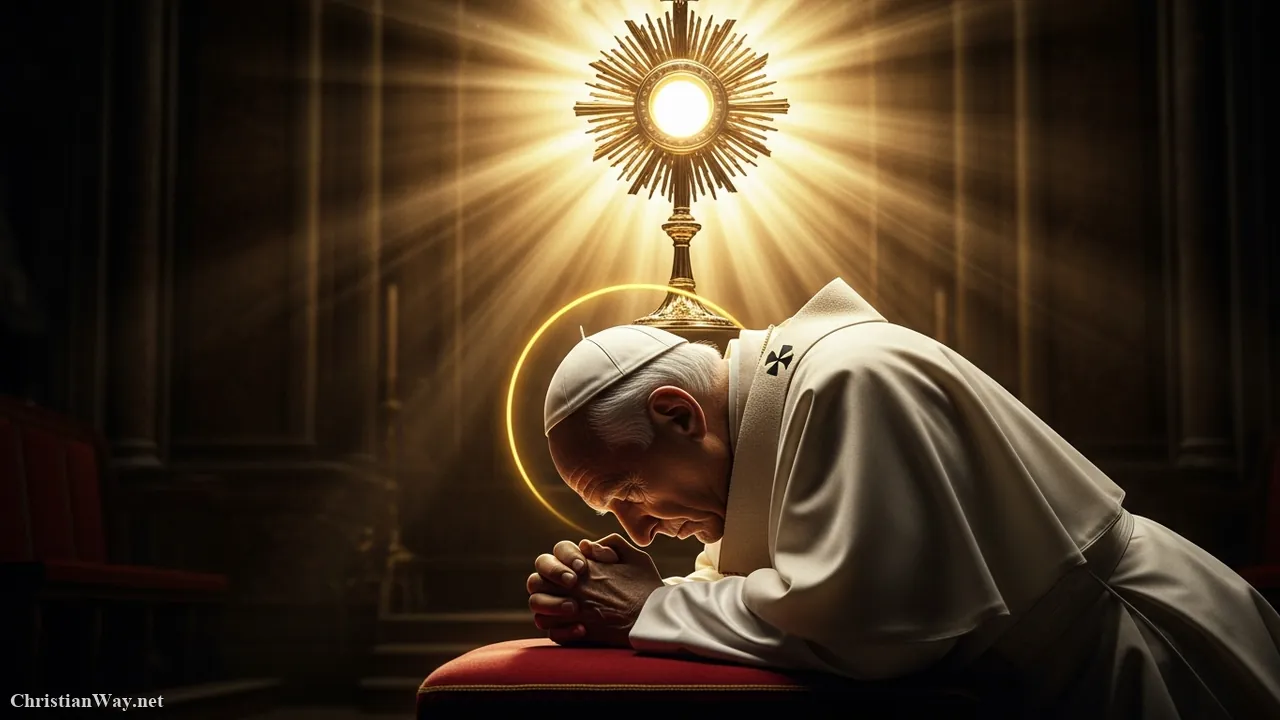
1. The Scene (Context): The Polish Pope, Karol Wojtyła, was the first non-Italian in 455 years, and his pontificate was marked by a tireless, energetic engagement with the modern world. He was a global pilgrim who visited 129 countries, speaking to immense crowds and engaging cultures on their own terms. We picture him kissing the ground upon arrival, a simple, profound gesture of respect for the people and the land. He was a man of radical prayer, often found prostrate before the Blessed Sacrament, and a man who suffered publicly, offering his final, years-long struggle with Parkinson’s disease as his final, powerful homily.
2. The Theology (Meaning): His impact was theological and geopolitical. His support for the Solidarity movement in Poland was instrumental in the peaceful collapse of the Soviet Union’s Communist regimes—a testament to the power of spiritual truth over totalitarian lies. Theologically, his profound teachings on the human person, notably his “Theology of the Body,” restored the dignity of human sexuality and married love, while his tireless defense of the unborn championed a “Gospel of Life” for a secular world.
3. The Application (Pastoral Care): St. John Paul II is the ultimate witness to the universal call to holiness in the modern age. He showed us that sanctity is not a retreat from the world, but a courageous engagement with its deepest needs and wounds. He challenges us to be “not afraid,” to open the doors of our lives and society to Christ, to embrace the truth of our God-given identity, and to use the suffering of our lives as a unique and powerful means of participating in the saving work of Christ.
Spiritual Highlights
- Traveled more than any other Pope in history, bringing the Gospel to every corner of the globe.
- His life and teachings were a powerful catalyst in the fall of Communism in Eastern Europe.
- Scriptural Anchor: “Do not be overcome by evil, but overcome evil with good.” (Romans 12:21)
Top 3. St. Celestine I, Pope from 422–432
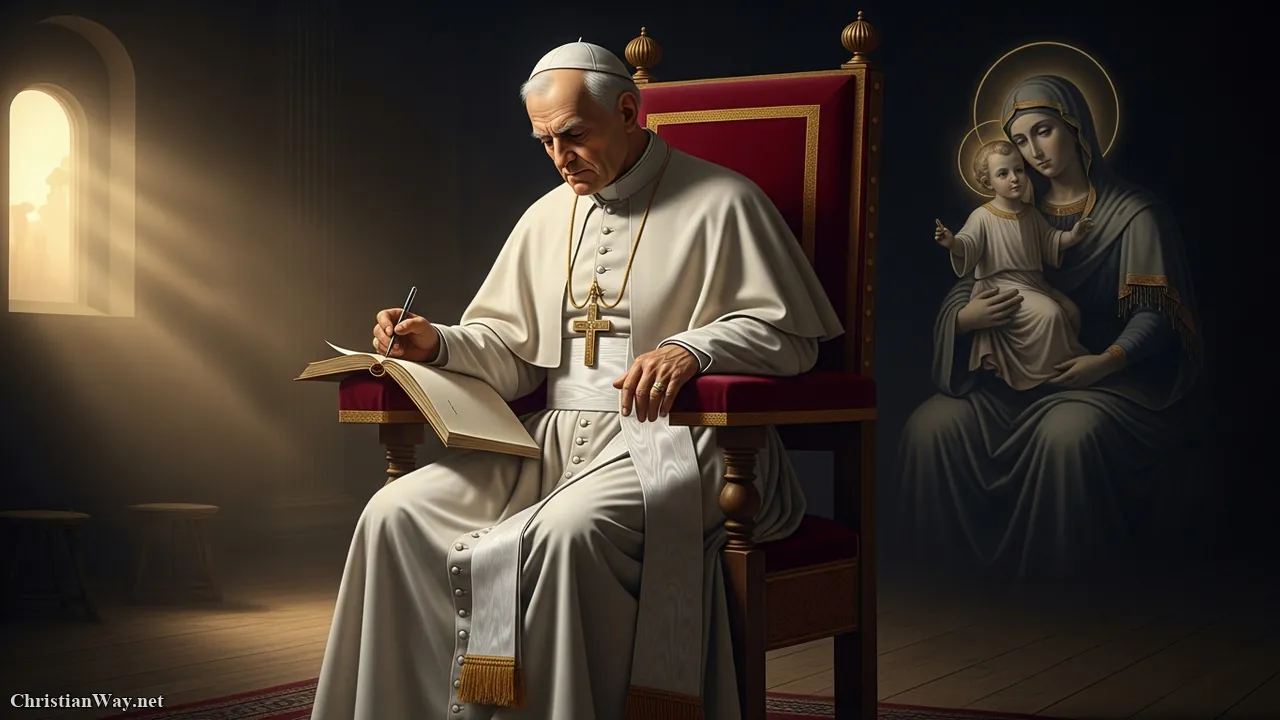
1. The Scene (Context): St. Celestine I reigned during the explosive controversy ignited by Nestorius, the Patriarch of Constantinople, who rejected the title Theotokos (God-bearer or Mother of God) for the Virgin Mary. Imagine the shock and confusion this caused in the early Church! Celestine, in Rome, provided the firm, uncompromising doctrinal center. He quickly condemned Nestorius’s error and sent St. Cyril of Alexandria as his representative to the Council of Ephesus (431), instructing him to insist upon the integral truth of Mary’s title, thereby defending the fundamental nature of Jesus Christ.
2. The Theology (Meaning): The sanctity of St. Celestine I rests in his unwavering defense of Christological truth. By insisting that Mary is the Mother of God, he was not just honoring the Virgin; he was safeguarding the truth of the Incarnation—that the Son born of Mary is truly God made flesh. If Christ was not God from the moment of conception, the entire economy of salvation collapses. Celestine’s quick, clear, and powerful response prevented a potentially catastrophic split in the understanding of the Divine-Human Person.
3. The Application (Pastoral Care): St. Celestine’s example is a call to stand up for the seemingly complex doctrines that hold the spiritual life together. We learn that devotion to Mary is inseparably linked to devotion to Christ. He asks us, when we face ideas that seek to diminish the greatness of Jesus or confuse His nature, to stand firm in the traditional, orthodox faith of the Church, for it is the only road to full communion with the living Christ.
Spiritual Highlights
- Championed the orthodox title of Theotokos (Mother of God) at the Council of Ephesus.
- Sent missionaries to Ireland (including St. Patrick) and other regions to strengthen the faith.
- Scriptural Anchor: “Great indeed, we confess, is the mystery of godliness: He was manifested in the flesh…” (1 Timothy 3:16)
Top 2. St. Gregory the Great (Gregory I), Pope from 590–604

1. The Scene (Context): St. Gregory I was the second Pope to be called “the Great,” and his influence reshaped the papacy from a purely spiritual office to one that was also a crucial, benevolent temporal power, administering food and defense to a Rome besieged by barbarian tribes. Originally a wealthy Roman official, he gave up his fortune to found monasteries, yearning for a quiet, contemplative life. He was pulled, against his will, into the papacy, and in a profound act of humility, he coined the title by which Popes are still known today: “Servant of the Servants of God” (Servus Servorum Dei). His most famous desire was for the conversion of the Angles (English), upon seeing fair-haired slaves in the market, declaring they were “not Angles, but Angels.”
2. The Theology (Meaning): Gregory’s writings, which earned him the title Doctor of the Church, including his Pastoral Rule and his commentaries on Scripture, formed the bedrock of medieval spirituality and moral theology. His work integrated the contemplative life of the monk with the active duties of the shepherd, providing a practical guide for all who lead the Church. His legacy includes the formalization of Church music into what we now know as Gregorian Chant—a testament to his desire that even the liturgy should be ordered, beautiful, and conducive to piety.
3. The Application (Pastoral Care): St. Gregory the Great is the patron of the true pastoral heart. He teaches us that true leadership in Christ’s Church must flow from humility and must prioritize the needs of the soul and body of the flock. His life challenges every leader, teacher, or parent to see their authority not as a right, but as a selfless service—to feed the hungry, clothe the naked, and provide the spiritual nourishment of the Word and the Sacrament, just as he did for the suffering city of Rome and the nascent nations of Europe.
Spiritual Highlights
- Instituted the title “Servant of the Servants of God” (Servus Servorum Dei).
- Doctor of the Church; formalized Gregorian Chant and sent the mission to convert the English.
- Scriptural Anchor: “But among you it will be different. Whoever wants to be a leader among you must be your servant.” (Mark 10:43)
Top 1. St. Peter (Simon Bar-Jona), Pope from c. 30–67
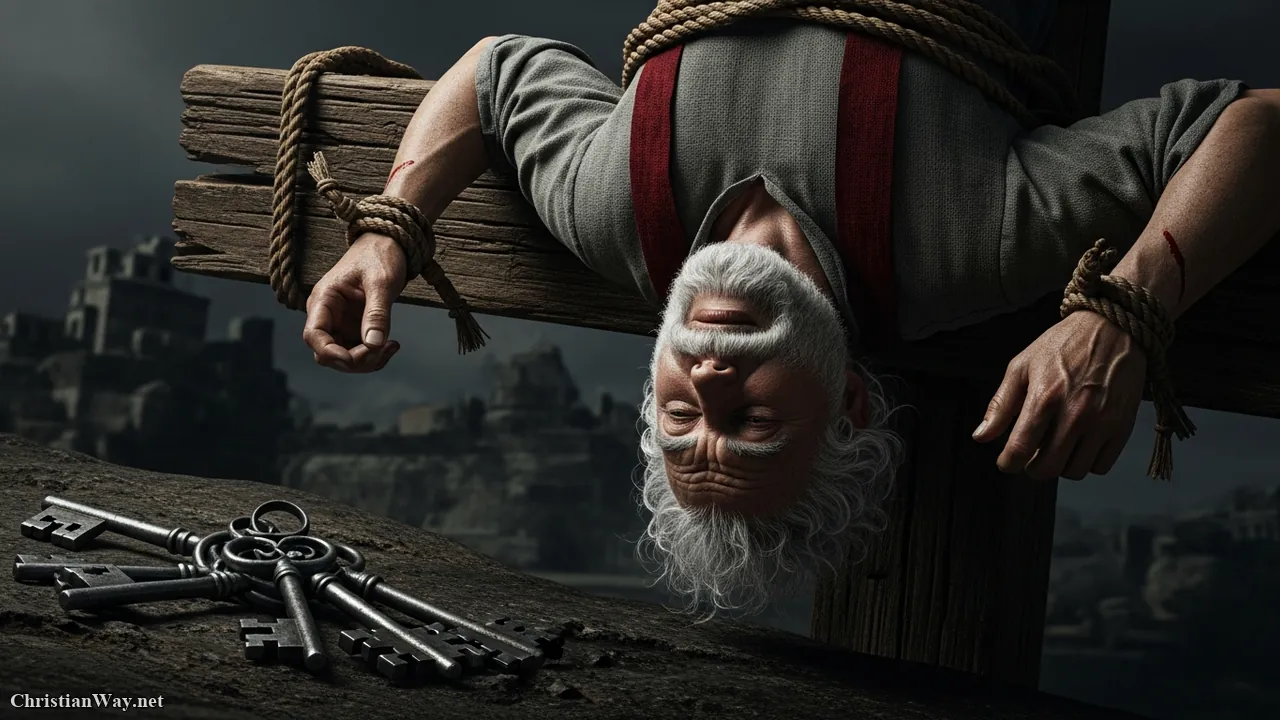
1. The Scene (Context): At the pinnacle of this sacred list stands St. Peter, the first to hold the office. He was a simple, passionate fisherman from Galilee, rough-hewn and prone to mistakes, yet chosen by Christ Himself to be the foundational “Rock” upon which the Church would be built (Matthew 16:18). His life is a dramatic story of initial weakness—his three-fold denial of Christ—followed by a heroic, redeeming love demonstrated in his post-Resurrection call to “Feed my lambs… Feed my sheep” (John 21:15-17). The tradition holds that he was martyred in Rome, crucified upside down at his own request, believing himself unworthy to die in the same manner as his Lord.
2. The Theology (Meaning): St. Peter is the physical and spiritual anchor of the entire Petrine office. His confession, “You are the Christ, the Son of the living God,” is the theological core of the faith. His life and martyrdom in Rome established the city as the center of the Christian world, the place where the fisherman’s boat came to rest. His ultimate sanctity is found in his complete submission to Christ’s authority, translating the keys of the Kingdom from a metaphor into the hard-won reality of his personal sacrifice.
3. The Application (Pastoral Care): Peter’s life is the most comforting of all, for it is a profound testament to Christ’s boundless mercy and the power of repentance. He reminds us that our past failures—even our most painful denials—do not disqualify us from great service in the Kingdom. His final call is simply to love Jesus above all else, to follow Him, and to bravely take up the mission of spiritual care, knowing that even our deepest weakness is covered by the strength of the divine call. We are all called to be Peter, to confess Christ, to fail, to repent, and to feed the flock of God.
Spiritual Highlights
- The Apostle appointed by Christ as the “Rock” and first Bishop of Rome.
- Crucified upside down in Rome, a witness to the ultimate self-sacrifice for Christ.
- Scriptural Anchor: “He said to him, ‘Feed my lambs,’ ‘Tend my sheep,’ ‘Feed my sheep.'” (John 21:15-17)
Reflect and Pray: The Legacy of the Keys
My brothers and sisters, what unites these Holiest Popes Recognized as Saints is not their titles, but their fidelity. Whether confronting emperors, barbarians, heretics, or the immense pressures of the modern world, each of them found their strength not in the purple and gold, but in the white light of the Gospel. They remind us that the call to holiness is the same for the successor of Peter as it is for the simplest soul in the pew: to live in Christ, to suffer for Christ, and to serve our neighbors with sacrificial love.
As you leave this reflection, take a moment to pray for your own calling. Ask God for the humility of St. Gregory the Great, the courage of St. Paul VI in proclaiming truth, and the simple, enduring faith of St. Peter. May their lives encourage you to make your own corner of the world a sanctuary where Christ’s light is clearly seen.
— Fr. John Matthew, for Christian Way

